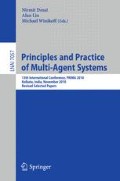Abstract
Multi-agent systems (MASs) are one of the effective approaches for dealing with the recent increase in software complexity and their autonomy. In the MAS research community, there has recently been increasing interest in the adoption of requirements engineering techniques to bridge the gap between the system requirements and the system design. One of the most important tasks based on the requirements description in the MAS design activity is the extraction of roles, which are the fundamental components of multi-agent systems, from it. It is also important to comprehend the relative degree of responsibility of the individual roles. The comprehension helps the developer decide the system architecture and discuss the performance and stability of the system. We introduce the concept of importance as a quantitative metric and an evaluation framework for the extraction of a suitable role set for the system and the task assignment to these roles. The importance is propagated from the requirements to the roles through their assigned tasks. We demonstrate the effectiveness of our framework through a case study and show that our metric and evaluation framework help not only to identify the importance of each role, but also to determine the system architecture.
Access this chapter
Tax calculation will be finalised at checkout
Purchases are for personal use only
Preview
Unable to display preview. Download preview PDF.
References
Wooldridge, M.: An Introduction to Multiagent Systems, 2nd edn. John Wiley & Sons (2009)
Luck, M., Ashri, R., D’Inverno, M.: Agent-Based Software Development. Artech House (2004)
Bernon, C., Cossentino, M., Pavón, J.: Agent-oriented software engineering. The Knowledge Engineering Review 20(2), 99–116 (2005)
Dardenne, A., van Lamsweerde, A., Fickas, S.: Goal-directed requirements acquisition. Science of Computer Programming 20(1-2), 3–50 (1993)
Letier, E.: Reasoning about Agents in Goal-Oriented Requirements Engineering. PhD thesis, Universite Catholique de Louvain (2001)
van Lamsweerde, A.: Goal-oriented requirements engineering: A guided tour. In: Fifth IEEE International Symposium on Requirements Engineering (RE 2001), Toronto, Canada, pp. 249–262 (2001)
Nakagawa, H., Karube, T., Honiden, S.: Analysis of multi-agent systems based on KAOS modeling. In: Proc. of the 28th International Conference on Software Engineering (ICSE 2006), pp. 926–929. ACM, Shanghai (2006)
Zambonelli, F., Jennings, N.R., Wooldridge, M.: Developing multiagent systems: The Gaia methodology. ACM Transactions on Software Engineering and Methodology 12(3), 317–370 (2003)
Bresciani, P., Perini, A., Giorgini, P., Giunchiglia, F., Mylopoulos, J.: Tropos: An agent-oriented software development methodology. Autonomous Agents and Multi-Agent Systems 8(3), 203–236 (2004)
Juan, T., Sterling, L.: The ROADMAP Meta-Model for Intelligent Adaptive Multi-Agent Systems in Open Environments. In: Giorgini, P., Müller, J.P., Odell, J.J. (eds.) AOSE 2003. LNCS, vol. 2935, pp. 53–68. Springer, Heidelberg (2004)
Padgham, L., Winikoff, M.: Prometheus: A Methodology for Developing Intelligent Agents. In: Giunchiglia, F., Odell, J.J., Weiss, G. (eds.) AOSE 2002. LNCS, vol. 2585, pp. 174–185. Springer, Heidelberg (2003)
Cossentino, M., Gaglio, S., Sabatucci, L., Seidita, V.: The PASSI and Agile PASSI MAS Meta-Models Compared with a Unifying Proposal. In: Pěchouček, M., Petta, P., Varga, L.Z. (eds.) CEEMAS 2005. LNCS (LNAI), vol. 3690, pp. 183–192. Springer, Heidelberg (2005)
CEDITI: Objectiver, http://www.objectiver.com/
Karlsson, J.: Software requirements prioritizing. In: Proc. of the 2nd International Conference on Requirements Engineering (ICRE 1996), p. 110. IEEE CS (1996)
Karlsson, J., Ryan, K.: A cost-value approach for prioritizing requirements. IEEE Software 14(5), 67–74 (1997)
Bagnall, A.J., Rayward-Smith, V.J., Whittley, I.M.: The next release problem. Information and Software Technology 43(14), 883–890 (2001)
Zhang, Y., Harman, M., Mansouri, S.A.: The multi-objective next release problem. In: Proc. of the 9th Annual Conference on Genetic and Evolutionary Computation (GECCO 2007), pp. 1129–1137. ACM (2007)
Greer, D., Ruhe, G.: Software release planning: an evolutionary and iterative approach. Information and Software Technology 46(4), 243–253 (2004)
van den Akker, M., Brinkkemper, S., Diepen, G., Versendaal, J.: Software product release planning through optimization and what-if analysis. Information and Software Technology 50(1-2), 101–111 (2008)
Finkelstein, A., Harman, M., Mansouri, S.A., Ren, J., Zhang, Y.: A search based approach to fairness analysis in requirement assignments to aid negotiation, mediation and decision making, vol. 14, pp. 231–245. Springer, Heidelberg (2009)
Heindl, M., Biffl, S.: A case study on value-based requirements tracing. In: Proc. of ESEC/FSE-13, pp. 60–69. ACM (2005)
Egyed, A., Biffl, S., Heindl, M., Grünbacher, P.: Determining the cost-quality trade-off for automated software traceability. In: Proc. of the 20th IEEE/ACM International Conference on Automated Software Engineering (ASE 2005), pp. 360–363. ACM (2005)
Egyed, A., Biffl, S., Heindl, M., Grünbacher, P.: A value-based approach for understanding cost-benefit trade-offs during automated software traceability. In: Proc. of the 3rd International Workshop on Traceability in Emerging forms of Software Engineering (TEFSE 2005), pp. 2–7. ACM (2005)
Feather, M.S., Cornford, S.L.: Quantitative risk-based requirements reasoning. Requirements Engineering 8(4), 248–265 (2003)
Bresciani, P., Giorgini, P., Mouratidis, H., Manson, G.: Multi-Agent Systems and Security Requirements Analysis. In: Lucena, C., Garcia, A., Romanovsky, A., Castro, J., Alencar, P.S.C. (eds.) SELMAS 2003. LNCS, vol. 2940, pp. 35–48. Springer, Heidelberg (2004)
Yu, E.S.K.: Modeling organizations for information systems requirements engineering. In: Proc. of the First IEEE International Symposium on Requirements Engineering, pp. 34–41 (1993)
Author information
Authors and Affiliations
Editor information
Editors and Affiliations
Rights and permissions
Copyright information
© 2012 Springer-Verlag Berlin Heidelberg
About this paper
Cite this paper
Nakagawa, H., Yoshioka, N., Ohsuga, A., Honiden, S. (2012). A Framework for Validating Task Assignment in Multiagent Systems Using Requirements Importance. In: Desai, N., Liu, A., Winikoff, M. (eds) Principles and Practice of Multi-Agent Systems. PRIMA 2010. Lecture Notes in Computer Science(), vol 7057. Springer, Berlin, Heidelberg. https://doi.org/10.1007/978-3-642-25920-3_32
Download citation
DOI: https://doi.org/10.1007/978-3-642-25920-3_32
Publisher Name: Springer, Berlin, Heidelberg
Print ISBN: 978-3-642-25919-7
Online ISBN: 978-3-642-25920-3
eBook Packages: Computer ScienceComputer Science (R0)

